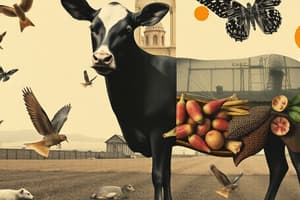Podcast
Questions and Answers
Which of the following is NOT an essential nutrient?
Which of the following is NOT an essential nutrient?
- Carbohydrates
- Proteins
- Water (correct)
- Fiber
What type of animal consumes a diet primarily consisting of plants?
What type of animal consumes a diet primarily consisting of plants?
- Omnivore
- Herbivore (correct)
- Detritivore
- Carnivore
Which of these processes involves the breakdown of food into smaller molecules?
Which of these processes involves the breakdown of food into smaller molecules?
- Ingestion
- Digestion (correct)
- Assimilation
- Absorption
What is the primary function of fiber in the diet?
What is the primary function of fiber in the diet?
What type of digestion involves the use of enzymes?
What type of digestion involves the use of enzymes?
What is the primary function of vitamins in the body?
What is the primary function of vitamins in the body?
Which of the following animals has a specialized stomach for digesting cellulose?
Which of the following animals has a specialized stomach for digesting cellulose?
What is the main consequence of a nutrient deficiency?
What is the main consequence of a nutrient deficiency?
Flashcards
Essential Nutrients
Essential Nutrients
Nutrients necessary for growth and bodily functions including carbohydrates, proteins, fats, fiber, vitamins, and minerals.
Types of Herbivores
Types of Herbivores
Organisms that primarily consume plant-based diets, such as cows and deer.
Types of Carnivores
Types of Carnivores
Organisms that primarily consume animal-based diets, such as lions and wolves.
Nutrient Uptake Process
Nutrient Uptake Process
Signup and view all the flashcards
Mechanical Digestion
Mechanical Digestion
Signup and view all the flashcards
Nutrient Deficiencies
Nutrient Deficiencies
Signup and view all the flashcards
Ruminant Animals
Ruminant Animals
Signup and view all the flashcards
Caecal Fermentation
Caecal Fermentation
Signup and view all the flashcards
Study Notes
Nutrient Requirements
- Vary among species, age, sex, and physiological state (e.g., growth, reproduction, lactation)
- Essential nutrients:
- Carbohydrates (energy source)
- Proteins (building blocks for tissues)
- Fats (energy source, hormone production)
- Fiber (digestive health)
- Vitamins (regulate metabolism, growth)
- Minerals (regulate metabolism, growth, maintain bodily functions)
Types of Nutrition
- Herbivores: plant-based diet (e.g., cows, deer)
- Carnivores: animal-based diet (e.g., lions, wolves)
- Omnivores: mixed diet (e.g., humans, bears)
- Detritivores: decomposing organic matter (e.g., earthworms)
- Saprotrophs: dead organic matter (e.g., fungi)
Nutrient Uptake and Utilization
- Ingestion: food intake
- Digestion: breakdown of food into nutrients
- Mechanical digestion: physical breakdown (e.g., chewing, grinding)
- Chemical digestion: enzymatic breakdown (e.g., proteins into amino acids)
- Absorption: nutrients absorbed into bloodstream
- Assimilation: nutrients used by body for energy, growth, and maintenance
Nutrient Deficiencies and Excesses
- Deficiencies: inadequate nutrient intake
- Can lead to impaired growth, reproduction, and immune function
- Excesses: excessive nutrient intake
- Can lead to health problems (e.g., obesity, kidney damage)
Specialized Nutritional Adaptations
- Ruminant animals: four-chambered stomach for digesting cellulose in plant cell walls (e.g., cows, goats)
- Caecal fermentation: specialized gut microbiome for fiber digestion (e.g., rabbits, horses)
- Nectarivory: specialized tongue and gut for digesting nectar (e.g., hummingbirds)
Nutrient Requirements
- Nutrient needs differ among species, age, sex, and physiological state (growth, reproduction, lactation)
- Essential nutrients include carbohydrates, proteins, fats, fiber, vitamins, and minerals
Nutrient Classification
- Carbohydrates serve as an energy source
- Proteins act as building blocks for tissues
- Fats provide energy and facilitate hormone production
- Fiber supports digestive health
- Vitamins regulate metabolism and growth
- Minerals regulate metabolism, growth, and maintain bodily functions
Types of Nutrition
- Herbivores feed on plant-based diets (e.g., cows, deer)
- Carnivores consume animal-based diets (e.g., lions, wolves)
- Omnivores have mixed diets (e.g., humans, bears)
- Detritivores feed on decomposing organic matter (e.g., earthworms)
- Saprotrophs feed on dead organic matter (e.g., fungi)
Nutrient Uptake and Utilization
- Ingestion involves food intake
- Mechanical digestion involves physical breakdown (e.g., chewing, grinding)
- Chemical digestion involves enzymatic breakdown (e.g., proteins into amino acids)
- Absorption involves nutrients being absorbed into the bloodstream
- Assimilation involves nutrients being used by the body for energy, growth, and maintenance
Nutrient Deficiencies and Excesses
- Nutrient deficiencies occur when there is inadequate nutrient intake
- Deficiencies can lead to impaired growth, reproduction, and immune function
- Nutrient excesses occur when there is excessive nutrient intake
- Excesses can lead to health problems (e.g., obesity, kidney damage)
Specialized Nutritional Adaptations
- Ruminant animals have four-chambered stomachs for digesting cellulose in plant cell walls (e.g., cows, goats)
- Caecal fermentation involves a specialized gut microbiome for fiber digestion (e.g., rabbits, horses)
- Nectarivory involves a specialized tongue and gut for digesting nectar (e.g., hummingbirds)
Studying That Suits You
Use AI to generate personalized quizzes and flashcards to suit your learning preferences.




